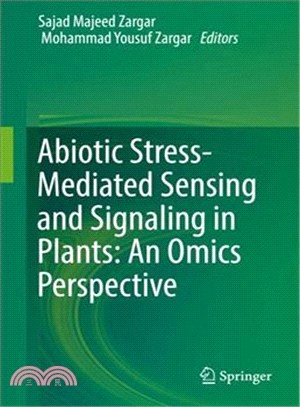Abiotic Stress-mediated Sensing and Signaling in Plants ― An Omics Perspective
商品資訊
ISBN13:9789811074783
出版社:Springer Verlag
作者:Sajad Majeed Zargar (EDT); Mohammad Yousuf Zargar (EDT)
出版日:2018/03/06
裝訂:精裝
規格:23.5cm*15.5cm (高/寬)
商品簡介
The natural environment for plants is composed of a complex set of abiotic and biotic stresses; plant responses to these stresses are equally complex. Systems biology allows us to identify regulatory hubs in complex networks. It also examines the molecular “parts” (transcripts, proteins and metabolites) of an organism and attempts to combine them into functional networks or models that effectively describe and predict the dynamic activities of that organism in different environments.
This book focuses on research advances regarding plant responses to abiotic stresses, from the physiological level to the molecular level. It highlights new insights gained from the integration of omics datasets and identifies remaining gaps in our knowledge, outlining additional focus areas for future crop improvement research.
Plants have evolved a wide range of mechanisms for coping with various abiotic stresses. In many crop plants, the molecular mechanisms involved in a single type of stress tolerance have since been identified; however, in order to arrive at a holistic understanding of major and common events concerning abiotic stresses, the signaling pathways involved must also be elucidated. To date several molecules, like transcription factors and kinases, have been identified as promising candidates that are involved in crosstalk between stress signalling pathways. However, there is a need to better understand the tolerance mechanisms for different abiotic stresses by thoroughly grasping the signalling and sensing mechanisms involved.
Accordingly, this book covers a range of topics, including the impacts of different abiotic stresses on plants, the molecular mechanisms leading to tolerance for different abiotic stresses, signaling cascades revealing cross-talk among various abiotic stresses, and elucidation of major candidate molecules that may provide abiotic stress tolerance in plants.
作者簡介
Mohammad Yousuf Zargar, Ph.D, is currently Director Research at Sher-e-Kashmir University of Agricultural Sciences & Technology of Kashmir (SKUAST-Kashmir) in India. He was previously Dean, Faculty of Agriculture; Dean, Faculty of Forestry; Associate Director Research and Associate Dean, Faculty of Agriculture, SKUAST-Kashmir. Prior to that he has worked as Professor-cum-Chief Scientists (Microbiology) at SKUAST-Kashmir. Dr. Zargar has published more than 160 research papers in the scientific journals of national and international repute. He has guided 8 students for the doctoral programme and 6 for the master’s programme. He has received many honours and awards for his contribution to research work. His major contribution has been on fermentation technology for mass multiplication of biofertilizers and biocontrol agents. Dr. Zargar has received appreciations for his product “Shalimar Microbes”, a consortium of microbes that decompose waste in a short period. Dr. Zargar has been actively pursuing the research on cold tolerant microbes for soild / liquid waste decomposition and nutrient mobilisation. He has also served as associate editor of several scientific journals. Presently, Dr. Zargar is guiding research programmes of the University in agriculture, animal husbandry and other allied sections.
主題書展
更多書展今日66折
您曾經瀏覽過的商品
購物須知
外文書商品之書封,為出版社提供之樣本。實際出貨商品,以出版社所提供之現有版本為主。部份書籍,因出版社供應狀況特殊,匯率將依實際狀況做調整。
無庫存之商品,在您完成訂單程序之後,將以空運的方式為你下單調貨。為了縮短等待的時間,建議您將外文書與其他商品分開下單,以獲得最快的取貨速度,平均調貨時間為1~2個月。
為了保護您的權益,「三民網路書店」提供會員七日商品鑑賞期(收到商品為起始日)。
若要辦理退貨,請在商品鑑賞期內寄回,且商品必須是全新狀態與完整包裝(商品、附件、發票、隨貨贈品等)否則恕不接受退貨。
























